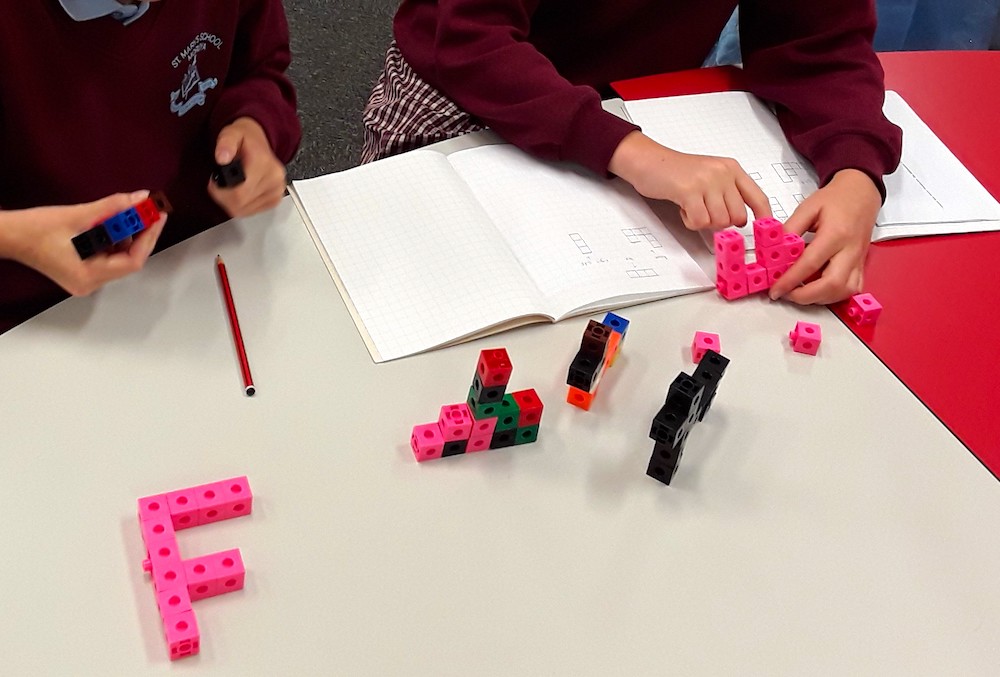
Processing graphical information in digital environments: Visuospatial reasoning in mathematics
Australian Research Council Discovery Grant
Tom Lowrie (Chief Investigator), Tracy Logan (Partner Investigator), Professor Mary Hegarty (Partner Investigator, University of California Santa Barbara).
Increasingly, mathematics competence will be measured in digital and dynamic contexts. Students who possess high spatial reasoning skills will become even better equipped to succeed in STEM-related disciplines like mathematics as technological advances shape how we interpret and decode information.
This project: (1) explored those aspects of spatial reasoning critical for success when students encounter dynamic mathematics tasks; and (2) determined underlying relationships between spatial processes and decoding of different types of mathematical tasks, through targeted intervention. Spatial reasoning skills are a significant predictor of achievement in STEM disciplines, even after controlling for mathematics competence.
The project aimed to better understand how students process mathematics tasks in a digital environment, so the inevitable move toward digital assessment can be managed effectively to promote assessment for learning.
Project aims
- Development of digital mathematics assessments that contained static and dynamic (i.e., innovative) graphics tasks for primary and secondary students;
- Identify and describe student performance and reasoning on graphics tasks in static and dynamic forms across grades 4 through 9; and
- Determine the nature and influence of spatial reasoning on student performance and mathematics through targeted intervention programs.
Outcomes
The project resulted in the successful development of digital primary and secondary assessments covering a broad range of mathematical content and item response types to assess mathematics understanding and development.
The digital assessments were implemented across primary and secondary classrooms to explore developmental changes in numeracy understanding, strategy use and links to spatial reasoning.
In addition, two successful spatial interventions were completed in classroom settings; 1) a three-week spatial visualization program in grade 5 and 6 classrooms, and 2) a 12-hour spatial intervention program in 32 grade 8 classrooms. Both interventions produced improvements in spatial reasoning skills as well as mathematics achievement.
The outcomes of this project 1) shed light on the impact of digital testing for mathematics and the role spatial reasoning plays within a digital assessment platform, and 2) provide evidence for a sound pedagogical framework for implementing spatial interventions in classroom practice.
Select project publications
Lowrie, T., Harris, D., Logan, T., & Hegarty, M. (2021). The impact of a spatial intervention program on students’ spatial reasoning and mathematics performance. The Journal of Experimental Education, 89(2), 259-277.
Lowrie, T., Logan, T., & Hegarty, M. (2019). The influence of spatial visualization training on students’ spatial reasoning and mathematics performance. Journal of Cognition and Development, 20(5), 729-751.
Lowrie, T., Resnick, I., Harris, D., & Logan, T. (2020). In search of the mechanisms that enable transfer from spatial reasoning to mathematics understanding. Mathematics Education Research Journal, 32(2), 175-188.
Harris, D., Lowrie, T., Logan., & Hegarty, M. (2021). Spatial reasoning, mathematics, and gender: Do spatial constructs differ in their contribution to performance? British Journal of Educational Psychology, 91(1), 409-441.
Harris, D., Logan, T., & Lowrie, T. (2021). Unpacking mathematical-spatial relations: Problem-solving in static and interactive tasks. Mathematics Education Research Journal, 33, 495-511.
Harris, D., Logan, T., & Lowrie, T. (2023). Spatial visualization and measurement of area: A case study in spatialized mathematics instruction. Journal of Mathematical Behavior, 70.
Lowrie, T., & Logan, T. (2018). The interaction between spatial reasoning constructs and mathematics understandings in elementary classrooms. In K. S. Mix & M. T. Battista (Eds.), Visualizing Mathematics: The role of spatial reasoning in mathematical thought (253-276). Switzerland: Springer.
Lowrie, T., Logan, T., Harris, D., & Hegarty, M. (2018). The impact of an intervention program on students’ spatial reasoning: Student engagement through mathematics-enhanced learning activities. Cognitive Research: Principles and Implications, 3(50), 1-10.
Select project presentations
Lowrie, T. (2021). Classroom-based spatial reasoning interventions promote mathematics thinking. Mathematics Association of New South Wales [Virtual Keynote].
Lowrie, T. (2019). Effects of a Spatial Visualization Training Program on Students’ Spatial Thinking and Mathematics Performance. Society for Research in Child Development Conference. Baltimore, USA.
Forndran, A., Lowrie, T., & Harris, D. (2019). Strategy Use in Mathematics Assessment: Does Spatial Reasoning Matter? In G. Hine, S. Blackley, & A. Cooke (Eds.). Mathematics Education Research: Impacting Practice (Proceedings of the 42nd annual conference of the Mathematics Education Research Group of Australasia) pp. 276-283. Perth: MERGA.
Harris, D., Logan, T., & Forndran, A. (2019). Utilising digital testing to identify spatial reasoning trends in mathematics problem-solving. 42nd Annual Conference of the Mathematics Education Research Group of Australasia Inc. Perth, Western Australia.
Lowrie, T. (2018). The practice and practise of spatial reasoning. University of Cincinnati
Lowrie, T. (2018). Spatial Reasoning in the Classroom: The Effectiveness of Classroom-based Spatial Intervention Programs. Canberra Mathematics Association.
Hegarty, M. (2018). Individual Differences in Spatial Thinking: Implications for Education. What we know and what we need to know. SERC Spatial Reasoning Conference. Canberra, Australia
Lowrie, T. (2018). STEM-focused engagement and impact: Capacity building through nation-wide and localised learning programs. Mathematical Association of Victoria. Melbourne, Australia
Lowrie, T. (2016). Spatial Reasoning Intervention Programs: The Case of Mathematics Education. SERC Spatial Reasoning Seminar. Canberra, Australia
